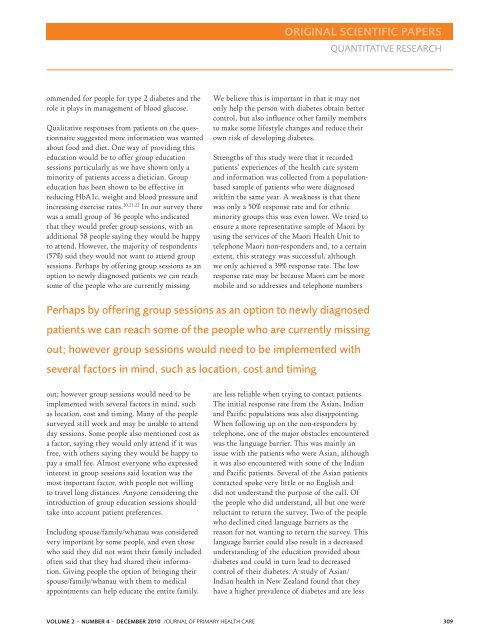The requirement to respect autonomy - The Royal New Zealand ...
The requirement to respect autonomy - The Royal New Zealand ...
The requirement to respect autonomy - The Royal New Zealand ...
- No tags were found...
You also want an ePaper? Increase the reach of your titles
YUMPU automatically turns print PDFs into web optimized ePapers that Google loves.
ORIGINAL SCIENTIFIC PAPErSquantitative researchommended for people for type 2 diabetes and therole it plays in management of blood glucose.Qualitative responses from patients on the questionnairesuggested more information was wantedabout food and diet. One way of providing thiseducation would be <strong>to</strong> offer group educationsessions particularly as we have shown only aminority of patients access a dietician. Groupeducation has been shown <strong>to</strong> be effective inreducing HbA1c, weight and blood pressure andincreasing exercise rates. 20,21,22 In our survey therewas a small group of 36 people who indicatedthat they would prefer group sessions, with anadditional 58 people saying they would be happy<strong>to</strong> attend. However, the majority of respondents(57%) said they would not want <strong>to</strong> attend groupsessions. Perhaps by offering group sessions as anoption <strong>to</strong> newly diagnosed patients we can reachsome of the people who are currently missingWe believe this is important in that it may no<strong>to</strong>nly help the person with diabetes obtain bettercontrol, but also influence other family members<strong>to</strong> make some lifestyle changes and reduce theirown risk of developing diabetes.Strengths of this study were that it recordedpatients’ experiences of the health care systemand information was collected from a populationbasedsample of patients who were diagnosedwithin the same year. A weakness is that therewas only a 50% response rate and for ethnicminority groups this was even lower. We tried <strong>to</strong>ensure a more representative sample of Maori byusing the services of the Maori Health Unit <strong>to</strong>telephone Maori non-responders and, <strong>to</strong> a certainextent, this strategy was successful, althoughwe only achieved a 39% response rate. <strong>The</strong> lowresponse rate may be because Maori can be moremobile and so addresses and telephone numbersPerhaps by offering group sessions as an option <strong>to</strong> newly diagnosedpatients we can reach some of the people who are currently missingout; however group sessions would need <strong>to</strong> be implemented withseveral fac<strong>to</strong>rs in mind, such as location, cost and timingout; however group sessions would need <strong>to</strong> beimplemented with several fac<strong>to</strong>rs in mind, suchas location, cost and timing. Many of the peoplesurveyed still work and may be unable <strong>to</strong> attendday sessions. Some people also mentioned cost asa fac<strong>to</strong>r, saying they would only attend if it wasfree, with others saying they would be happy <strong>to</strong>pay a small fee. Almost everyone who expressedinterest in group sessions said location was themost important fac<strong>to</strong>r, with people not willing<strong>to</strong> travel long distances. Anyone considering theintroduction of group education sessions shouldtake in<strong>to</strong> account patient preferences.Including spouse/family/whanau was consideredvery important by some people, and even thosewho said they did not want their family includedoften said that they had shared their information.Giving people the option of bringing theirspouse/family/whanau with them <strong>to</strong> medicalappointments can help educate the entire family.are less reliable when trying <strong>to</strong> contact patients.<strong>The</strong> initial response rate from the Asian, Indianand Pacific populations was also disappointing.When following up on the non-responders bytelephone, one of the major obstacles encounteredwas the language barrier. This was mainly anissue with the patients who were Asian, althoughit was also encountered with some of the Indianand Pacific patients. Several of the Asian patientscontacted spoke very little or no English anddid not understand the purpose of the call. Ofthe people who did understand, all but one werereluctant <strong>to</strong> return the survey. Two of the peoplewho declined cited language barriers as thereason for not wanting <strong>to</strong> return the survey. Thislanguage barrier could also result in a decreasedunderstanding of the education provided aboutdiabetes and could in turn lead <strong>to</strong> decreasedcontrol of their diabetes. A study of Asian/Indian health in <strong>New</strong> <strong>Zealand</strong> found that theyhave a higher prevalence of diabetes and are lessVOLUME 2 • NUMBER 4 • DECEMBER 2010 J OURNAL OF PRIMARY HEALTH CARE 309
















